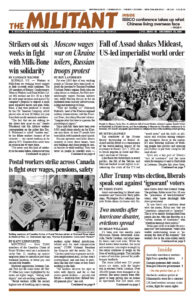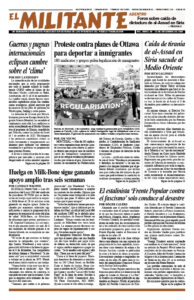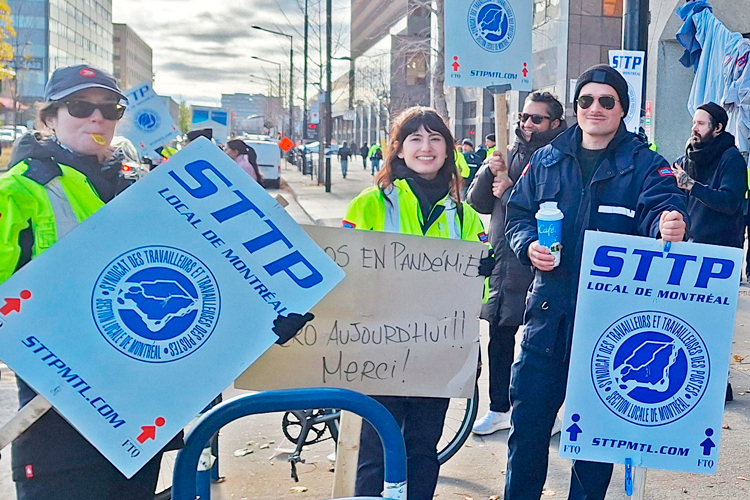MONTREAL — Over 55,000 members of the Canadian Union of Postal Workers went on a nationwide strike Nov. 15, standing up against employer plans to introduce part-time weekend positions at lower pay and second-rate benefits.
Mediated negotiations between Canada Post and the union broke off Nov. 27. Other key issues highlighted by the union are higher wages, “retiring with dignity” and safe working conditions.
“Postal workers suffer the second highest rate of disabling injury among workers under federal jurisdiction, behind only the road transportation sector,” CUPW National President Jan Simpson told the media Dec. 3. “Carriers need time to prepare and deliver neighborhood mail, so they aren’t overburdened, and real fixes to problems like late start times so they aren’t working in the dark.
“All workers deserve the right to retire with dignity, and for us that means postal workers — present and future — maintain their defined benefit pension plan,” she said.
Canada Post has offered a paltry 11.5% wage increase over four years. The Canadian Union of Postal Workers is looking for double that to catch up with inflation.
In a move the union denounced as “a clear intimidation tactic in violation of the Canada Labour Code” and “an attack on your fundamental right to strike,” Canada Post informed some employees they were laid off after the strike began.
Strikers at the Chabanel depot here also told this Militant worker-correspondent that health benefits have been discontinued by the employer, leaving those with cancer and other urgent care needs facing serious financial burdens.
Employer associations, backed by the boss press, have been campaigning for government strikebreaking intervention, reinforcing Canada Post’s intransigence. The Canadian Federation of Independent Business released a poll of its members saying 69% want Ottawa to “immediately” adopt back-to-work legislation. Jasmin Guenette, the federation’s vice president of national affairs, said the government “has the power and the duty to end the strike.”
Labor Minister Steven MacKinnon, while declaring himself “extremely frustrated,” has up to now ruled out government intervention.
But Philippe Tessier, Communist League candidate in the provincial by-election in Quebec’s Terrebonne riding and Teamsters rail worker and conductor at Canadian National Railway, noted, “Ottawa has ordered port workers in Quebec and British Columbia, members of the Canadian Union of Public Employees and of the International Longshore and Warehouse Union, along with Teamsters union rail workers, back to work under binding arbitration. We must fight to defend democratic freedoms, including the right to strike against Ottawa’s attacks.”
“I’ve joined fellow rail workers on the picket lines of the longshore workers and Canada Post strikers,” Tessier said.
Countering one aspect of the strikebreaking campaign, the Canadian Union of Postal Workers reiterated its commitment to delivering pension and social assistance checks. “We do not want pensioners and people who rely on government assistance to suffer during the current work disruption,” the union said Dec. 5. “Our fight is with Canada Post and not these members of society.”
Fridays are often targeted for special union picket action, bringing strikers from different depots together in a show of union strength. Some 150 demonstrated in St-Jerome, north of Montreal, Dec. 6, receiving many honks of support from passing drivers. Two hundred marched to the offices of Ottawa’s Quebec lieutenant minister, Jean-Yves Duclos, in Quebec City the same day.
“When employers unite to act against workers’ interests, I think it’s super important that unions mobilize as well,” Cory Crawford, a Teamster CN rail conductor who joined CUPW pickets Nov. 17, told the Militant, “and unite for a better life for those who produce the most in society — the workers.”
Build solidarity. Join the CUPW picket lines!


